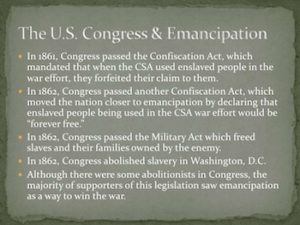
*The Confiscation Acts were introduced on this date in 1861. In U.S. history, this series of laws passed by the federal government during the American Civil War were designed to liberate Black slaves in the seceded confederate states.
The first Confiscation Act passed on Aug. 6, 1861, authorized the Union seizure of rebel property, and it stated that all slaves who fought with or worked for the Confederate military services were freed of further obligations to their masters. President Abraham Lincoln objected to the act on the basis that it might push border states, especially Kentucky and Missouri, into secession to protect slavery within their boundaries. He later convinced Congress to pass a resolution providing compensation to states that initiated a system of gradual emancipation, but the border states failed to support this plan.
Also, Lincoln repudiated the position of Generals John C. Frémont and David Hunter, who proclaimed that the first Confiscation Act was equivalent to a decree of emancipation. The second Confiscation Act, passed July 17, 1862, was virtually an emancipation proclamation. It said that slaves of civilian and military Confederate officials "shall be forever free," but it was enforceable only in areas of the South occupied by the Union Army. Lincoln was again concerned about the effect of an antislavery measure on the border states and again urged these states to begin gradual compensated emancipation.
On March 12, 1863, and July 2, 1864, the federal government passed additional measures ("Captured and Abandoned Property Acts") that defined property subject to seizure as owned by absent individuals who supported the South. The Confederate Congress also passed property confiscation acts to apply to Union adherents. However, the amount of land actually confiscated during or after the war by either side was not great. Cotton constituted nearly all the Southern non-slave property confiscated. With the issuance of the Emancipation Proclamation (1863) and passage of the Thirteenth Amendment to the Constitution, however, Southern slaveholders lost an estimated $2,000,000,000 worth of human property.